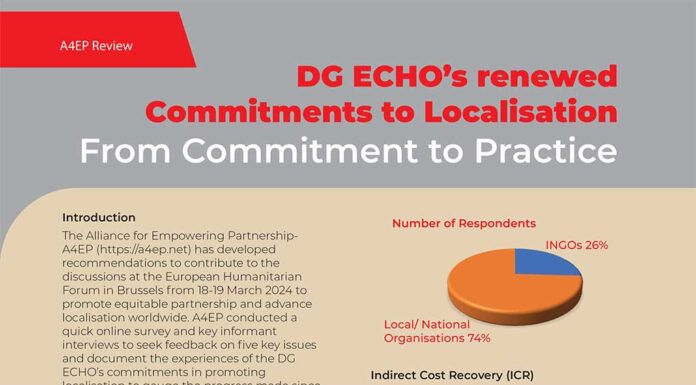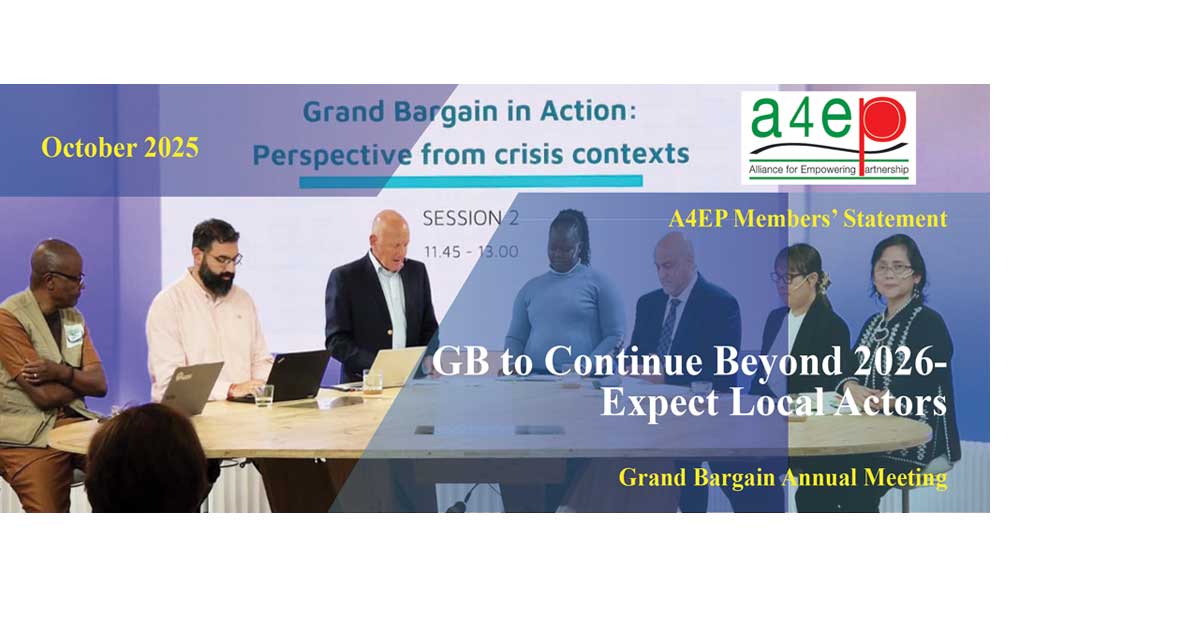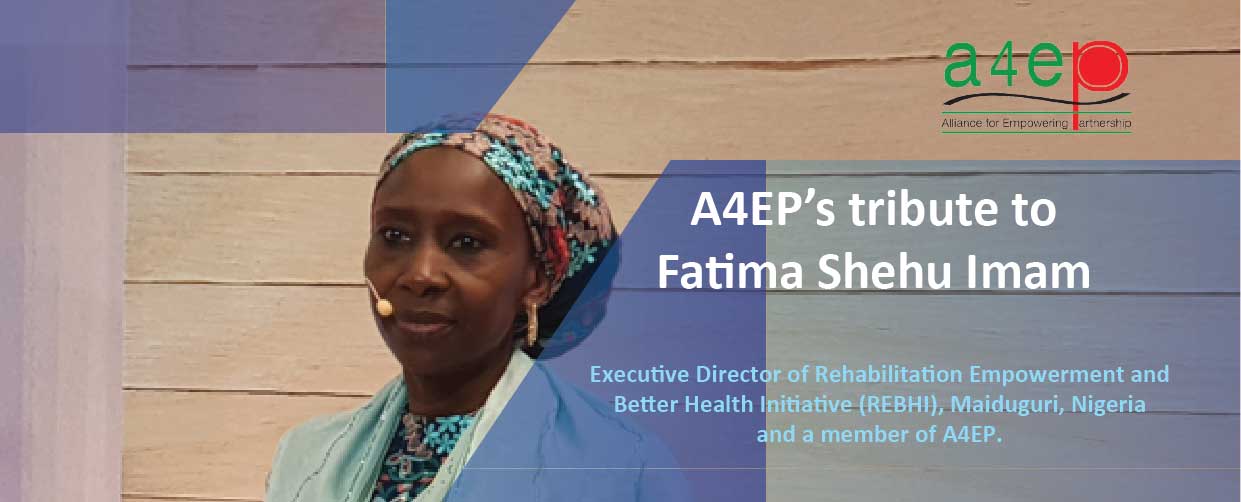Introduction The Alliance for Empowering Partnership- A4EP (https://a4ep.org) has developed recommendations to contribute to the discussions at the European Humanitarian Forum in Brussels from 18-19 March 2024 to promote equitable partnership and advance localisation worldwide. A4EP conducted a quick online survey and key informant interviews to seek feedback on five key issues and document the experiences of the DG ECHO’s commitments in promoting localisation to gauge the progress made since 2023. The DG ECHO guidance note emphasises that there are legal constraints enshrined in European Union law to providing direct funding to local actors. That means DG ECHO is not able to fund L/NAs directly. On the other hand, DG ECHO’s commitment to the localisation agenda is channelling funds as directly as possible. That effectively means local organisations can only receive funds directly through their international partners as intermediaries or as part of a consortium with international partners leading. The guidance note focuses on promoting equitable partnerships and localisation in those partnerships funded by DG ECHO. Keeping those issues in mind, our responders provided some invaluable recommendations for advancing equitable partnership and localisation.
Survey Findings
Allocation of Funding
A4EP received responses from eight countries. Among the responders, 74% represented Local/National Actors (L/NA), while 26% were from INGOs. Of these INGOs, 11% received direct funding from DG ECHO. Additionally, L/NAs reported partnerships with various international organisations. 18% of L/NAs had partnerships with INGOs receiving DG ECHO funds, with 11% being partnerships between INGO and INGO.
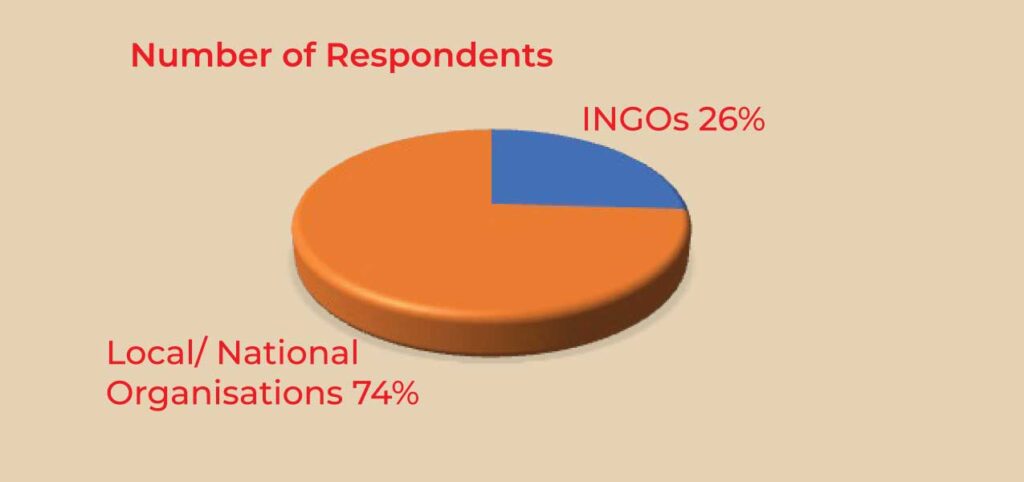
Indirect Cost Recovery (ICR)
The survey also inquired receiving adequate Indirect Cost Recovery (ICR) for institutional and capacity development as a local partner of DG ECHO funding. Amongst 29% of L/NAs who responded, 10% reported receiving ICR around 1-4%, while another 10% indicated they receive ICR in the 5-10% range. Additionally, 9% of L/NA respondents stated they receive no ICR to implement DG ECHO projects. Interestingly, some INGOs did not answer the question about the percentage of ICR they receive from DG ECHO.
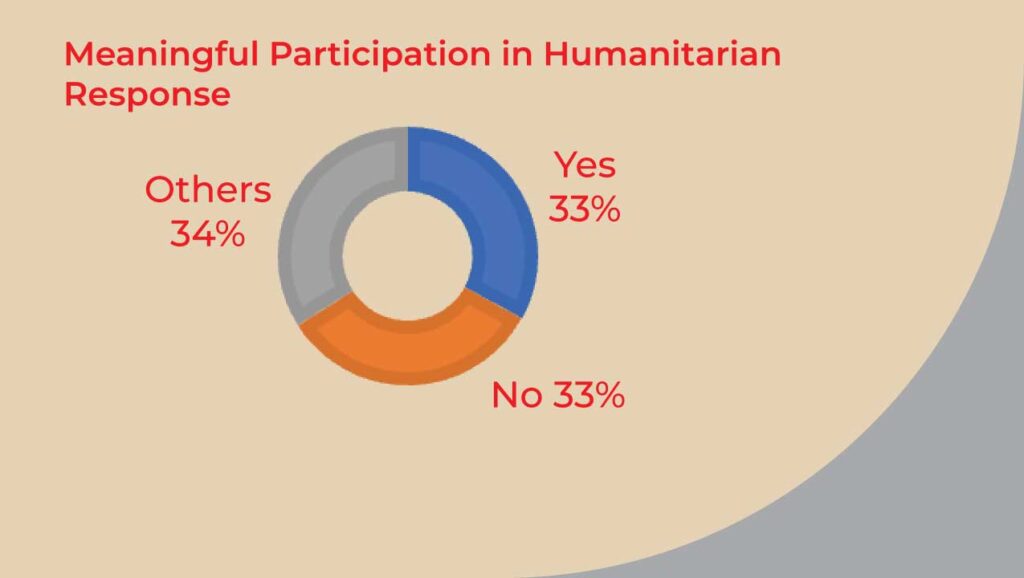
Meaningful participation of Local/ National Actors (L/NAs) in humanitarian response
In response to whether DG ECHO or international partners ensure the meaningful participation of L/NAs in humanitarian response, 33% of respondents answered affirmatively, stating that there is a meaningful partnership. Conversely, 33% of respondents indicated they did not see meaningful partnerships. Additionally, 34% of respondents cited other issues, such as not being a partner of DG ECHO or lack of awareness about it.
Strengthen the leadership of L/NAs in humanitarian coordination
On the question about help with strengthening the leadership of L/NAs in humanitarian coordination, 39% of respondents said yes, 27% said no, and 34% said other issues, e.g. they are not aware of the process of strengthening leadership.
Access to localised financing models
In response to the question about access to localised financing models, 22% of respondents said yes, 44% said no, and 34% said other issues, e.g. they don’t know about access to localised financing models.
Receiving direct funding from any other donors, including institutional donors
On the issues of receiving direct funding from any other institutional donors, 57% of respondents said yes, and they named USAID, UNPBF through Saferworld, UK – HQ, BRAC, DFAT, AUSAID, CIDA, FCDO, Embassy of the Kingdom of the Netherlands, EU Share Trust, and Start Fund. The recipients have good experience with direct funding.
Recommendations for advancing localisation and promoting equitable partnership
- Localisation demands a holistic approach. Provide comprehensive humanitarian support (involving INGO and L/NAs with their role) covering the complete cycle and recovery, livelihood, and Education in emergency support. Provide quality and flexible funding and core support for institutional development. ECHO should prioritise ensuring that local and national actors receive sufficient Indirect Cost Recovery (ICR) to facilitate their capacity-building endeavours. Prioritising the development of institutional and staff capacity through partnerships is crucial. Practices like hiring expatriates and poaching staff from Local/National Actors (L/NAs) should be strictly prohibited in collaborative efforts. By enhancing the capacity of local actors, program implementation costs can be significantly reduced, while program participants can have greater benefits.
- Equitable participation in shaping funding policies. Involve both INGOs and L/NAs in consultations, and particularly ensure the voices of local actors are heard on their specific needs, not from the recommendations from INGOs. Space should be created for L/NAs to actively participate in preparing response strategic planning at the country level. Ensure a robust reciprocal feedback system to document the learning and solve the problems respectfully.
- DG ECHO could explore the adoption of lower barriers to funding mechanisms for local organisations. For instance, utilising initiatives such as the START network, or at a minimum, its passporting element, could be considered. Ease of due diligence processes and open and transparent oversight mechanisms are put in place.
- Implementing a risk-sharing and risk appetite approach is essential to prevent local actors from bearing sole responsibility in response efforts. Currently, the risk stays mostly with the INGO, discouraging them from taking up new partners and sharing the ICR, as that is partly used to cover the risk. Convene meetings to think through risk mechanisms together with ECHO.
- Funding instruments available at the DG-ECHO level are not suitable for local & national level humanitarian actors. Therefore, we recommend developing new funding tools/instruments where L/NGOs can access funds directly through DG-ECHO. Donors should revise their funding access modality for CSO/LN/NNGO. It needs to be localisation friendly. Establish a localised financing system accessible only to local actors at the country level. There should be more effective engagement and communications with L/NA about such funding opportunities, not to be limited or visible for certain agencies in a specific arena. Facilitate direct and longer-term partnership modalities with L/NAs. Direct contact with national implementing partners is needed, not only through intermediaries.
Alliance for Empowering Partnership (A4EP) is a network of independent and locally grown civil society organisations in the global south and global activities and practitioners advocating to transform aid architecture based on community realities.
Download PDF copy click here


